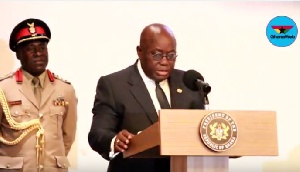Following a hint given by Senior Minister, Osafo Maafo, that the Akufo-Addo-led administration is investigating many former Ministers and government officials of the erstwhile Mahama government, reports of massive corruption have been uncovered in many state agencies.
This revelation was made by President Akufo-Addo, stating that audits of State institutions by his government has uncovered rot in most Ministries, Departments and Agencies (MDAs) in the country.
The President, who dropped the bombshell on Wednesday said, “Government has started comprehensive audits of various institutions and the findings to date reveal the depth of the rot that has almost become the character of the way we treat public resources and the way we perform our public duties and deliver public services.
It is unclear which specific institutions have so far been audited.
Akufo-Addo made this known during the launch of the book, ‘Making Africa Work,’ a first-hand account handbook of how to ensure growth beyond commodities and create jobs in the continent authored by Greg Mills, Jeffrey Herbst, former Nigerian President, Olusegun Obasanjo and Dickie Davies.
His revelations were made to stress his point on how corruption undermines the ability of governments to create jobs, insisting that “a major opportunity for job creation is by dealing with corruption.”
Even though the President's flagship policy of Special Prosecutor to fight corruption has been withdrawn from Parliament, he expressed optimism that the Bill will be re-presented in the House and passed for prosecution of corrupt individuals to begin.
According to President Akufo-Addo, “The most important issue facing African countries today is that of unemployment, especially youth unemployment.”
“Of the 1.2 billion, 15 to 24-year-olds in the world – 200 million of whom are in Africa – about 75 million are looking for work. Africa has the youngest population in the world, and about 10 million to 12 million young people join the labour market each year,” he noted.
“To keep the unemployment at current levels, African economies have to create some 10-12 million jobs a year and to reduce the current level of unemployment, many more jobs would have to be created.”
In Ghana, he indicated that about 60 percent of the unemployed are in the 15-24 age bracket.
“We are, therefore, moving quickly to create an environment that will unleash the innovative and entrepreneurial instincts of the Ghanaian people to drive rapid growth and job creation,” he emphasized.
This, according to him, was part of reason why government had decided to restore macroeconomic stability, move economic management from a focus on taxation to production, reduce the cost of doing business, the ‘One district, One factory’ programme and a host of other interventions.
General News of Saturday, 29 July 2017
Source: www.ghanaweb.com

















